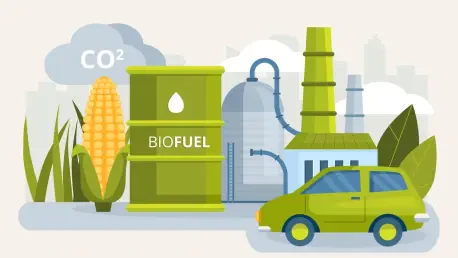In the current landscape of energy policies, President Donald Trump’s biofuel strategy has sparked a significant debate within the American oil industry. A revealing letter from the American Fuel and Petrochemical Manufacturers (AFPM) to Republican lawmakers highlights these growing tensions, especially concerning the push to increase corn-based ethanol from 10% to 15% in gasoline. This shift, initially met with neutrality by the AFPM, now faces strong opposition due to the potential additional compliance costs, which may reach $70 billion. This scenario sets the stage for an era of conflict between biofuel expansion and the traditional oil refining industry.
Overview of the Oil Industry Landscape
The oil industry is a complex and vast network characterized by diverse stakeholders and intricate technologies. It remains one of the most crucial sectors globally, significantly impacting economic stability and geopolitical dynamics. The industry is typically segmented into upstream exploration, midstream transportation, and downstream refining and marketing. Giant corporations like ExxonMobil and Chevron dominate the landscape alongside independent refiners such as PBF Energy and CVR Energy. Technological advancements have continually reshaped operations, while stringent regulations govern environmental and safety standards. As the industry navigates technological transformations and competition from renewable sectors, regulations remain vital in shaping its future.
Trends Shaping the Industry
Emerging Trends and Opportunities
The oil industry stands on the cusp of transformative trends driven by evolving technologies and consumer preferences. Innovations like digital oilfield technologies, advanced drilling techniques, and artificial intelligence are revolutionizing operations. Consumers increasingly favor cleaner energy solutions, nudging companies to explore renewable ventures and alternative fuels. As global energy demand continues to rise, opportunities to integrate biofuels emerge as a double-edged sword—offering growth possibilities while challenging traditional refining processes and economic viability.
Market Performance and Projections
Recent market performance indicates volatility but maintains an optimistic growth trajectory. Data suggest that demand for energy will continue to rise, driven by developing economies and technological integration. However, the push for sustainable energy sources complicates these projections. As the industry adapts to a more diversified energy mix, experts forecast moderate growth while oil companies pivot to incorporate clean energy into their portfolios. Investors and market stakeholders keep a close watch on shifting policies and the potential impact on long-term profitability.
Challenges and Issues in the Oil Industry
The oil industry faces a host of challenges ranging from technological to regulatory hurdles. The transition toward sustainable energy generates pressure on traditional operations, demanding significant capital investment in new technologies. Regulatory changes often introduce compliance risks and financial burdens, as seen with the increased ethanol mandates. Companies must navigate these complexities while maintaining economic viability, engaging in strategic partnerships, and fostering innovation to overcome obstacles.
Regulatory Environment and Impact of Policies
Regulations and policies form the backbone of the oil industry’s operational framework, influencing everything from safety standards to environmental compliance. The Trump administration’s biofuel mandates aim to support domestic agriculture and renewable industries, but critics argue they impose unfair costs on refiners and consumers. The ongoing discourse revolves around finding equilibrium that supports renewable energy goals without decimating the refining sector. Understanding compliance and adapting to evolving policies will be crucial for stakeholders aiming to sustain operations amid policy shifts.
The Future of the Oil Industry
Looking to the future, the oil industry stands at a crossroads of evolution and adaptation. The integration of renewable energy technologies alongside traditional oil production promises a diversified energy landscape. Market disruptors like electric vehicles and consumer preferences for sustainable energy sources could reshape demand patterns. Companies emphasizing innovation, regulatory compliance, and strategic adaptability are likely to navigate this transition successfully, maintaining relevance in a rapidly evolving industry.
Conclusion and Recommendations
The analysis reveals a multifaceted scenario where biofuel policies exacerbate existing tensions within the oil industry. Recognizing the delicate balance between fostering renewable energy and supporting the refining sector is critical for policymakers. Moving forward, stakeholders must collaborate to develop strategies that harmonize environmental goals with industry viability. Exploring joint ventures, enhancing technological capabilities, and prioritizing compliance will be essential for sustaining growth and ensuring a resilient energy future.









